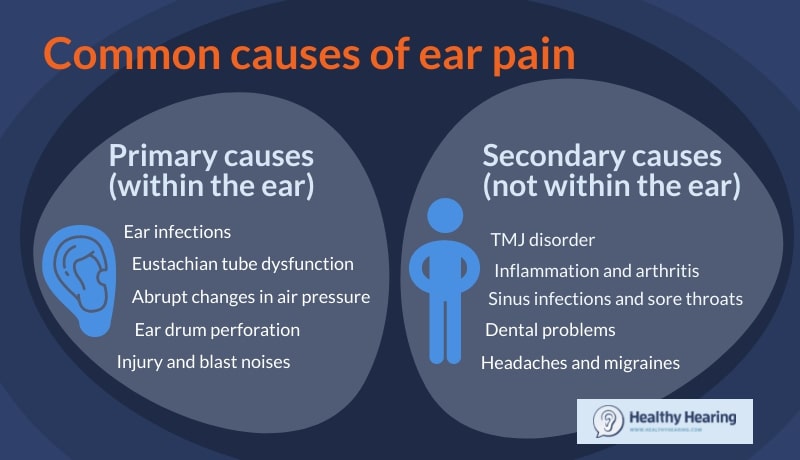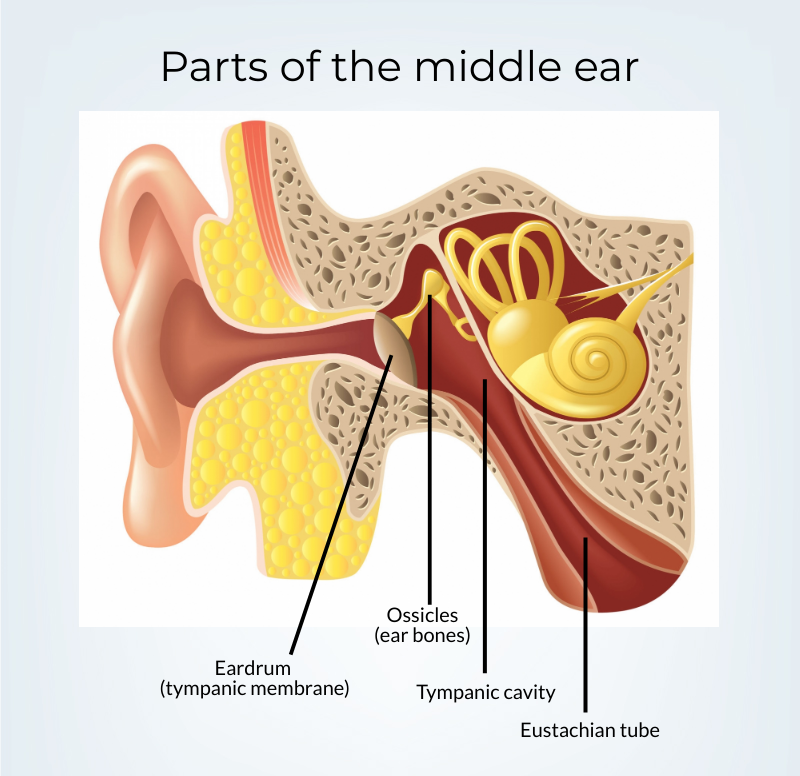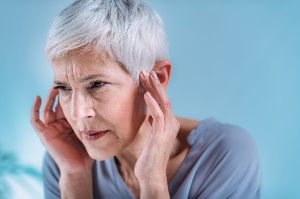Key points:
-
Ear pain can be caused by issues within the ear, or from other parts of the body like the jaw or neck.
-
Children may be more prone to ear pain due to an infection because their eustachian tubes aren't fully developed.
-
See a doctor for ear pain if it’s severe or worsening, lasts more than a day, or comes with other symptoms like hearing loss, dizziness, or drainage.
Pain in one or both ears can occur for a variety of reasons. Whether it's a sharp, sudden ache or a persistent, dull throb, understanding the potential causes of ear pain can help you determine the best course of action for relief.
What can cause ear pain?
When it comes to ear pain, doctors think of it in two categories:
- Primary pain caused by a problem in the ear itself
- Secondary pain that is felt in your ear but the problem is actually elsewhere in your body (referred pain)

6 common causes of ear pain
1. Swimmer’s ear
Ear pain from swimming, medically known as otitis externa, is an “infection of the tissues of the ear canal,” explains ear, nose and throat specialist Mark Nichols, MD, with Houston ENT & Allergy Clinic.
One cue that it might be what you’re experiencing: It’ll feel tender when you press on the ear canal, he says. It can happen in any situation where water gets in the ear canal, not just swimming.
Symptoms of swimmer’s ear include pain, itching, swelling, and pus draining out of the ear canal, notes Karen Hoffmann, MD, an ENT with Piedmont Ear, Nose, Throat & Related Allergy in Georgia.
Treatment options for swimmer's ear: Typically, your doctor will prescribe an ear drop with antibiotics for swimmer’s ear, Dr. Nichols says. It’s also important to keep your ear dry, he adds. If the infection is painful, you can take over-the-counter pain relievers like acetaminophen or ibuprofen.
2. Middle ear infection
A middle ear infection—aka otitis media—is the other main cause of non-referred ear pain, Dr. Nichols says. This can happen after a respiratory infection, cold, or sinus infection.
A majority—75%—of children have an ear infection by age three, and while adults can also get middle ear infections, it’s not as common, according to the National Library of Medicine (NLM).
This type of infection can lead to pain, along with hearing loss and fluid draining from the ear—in children, other symptoms include fussiness, loss of appetite, fever, and difficulty sleeping.
Treatment options for middle ear infection: While treatment is important for ear infections, antibiotics are not usually a first choice, per the American Academy of Family Physicians. Instead, doctors may opt to treat a child’s infection with over-the-counter pain relievers or ear drops for several days before writing a script for antibiotics.
3. Eustachian tube dysfunction

ear, leading to pain.
The eustachian tube connects the middle ear to the back of the nose, equalizing the pressure in the ear, Dr. Hoffmann explains. If something goes wrong inside the tube—such as swelling from allergies—pain can result.
"If there's significant swelling, say when you get a cold or when you have a sinus infection, or if you just have bad allergies, it causes inflammation of that lining of that eustachian tube,” she says—the end result is an inability to equalize the pressure, which can be painful.
Read more: What is eustachian tube dysfunction?
4. Barotrauma
Do your ears feel clogged or stuffy? You may have barotrauma, which occurs when the pressure within the eardrum and outside of it don’t match. Activities that lead to sudden pressure changes—like taking off in an airplane or descending during a scuba dive—can cause it.
And, when you’re all stuffed up from a cold or allergies, that can mess with the pressure as well.
Preventing barotrauma: If pressure-related issues are occurring due to a cold or allergies, try decongestants. If you develop ear pain caused by air pressure when flying, you can try taking Sudafed (pseudoephedrine) or an over-the-counter decongestant nasal spray beforehand. Other easy tactics include chewing gum or yawning.
Most importantly: When flying, don’t sleep as the plane lands. “You have the greatest increase in pressure as the plane is descending,” Dr. Hoffmann notes. So that’s when you’ll want to be awake, yawning or chewing gum as the plane lands to keep the pressure on an even keel.
5. Ruptured eardrum
Sharp ear pain can sometimes mean a ruptured eardrum. A rupture can occur due to:
- Ear infections
- Barotrauma
- Exposure to extremely loud noises
- Ear injuries
Along with ear pain, a perforated eardrum will cause hearing loss, tinnitus, dizziness and sometimes nausea. The good news? Damaged ear drums typically heal on their own. However, you should still see a doctor if you suspect a ruptured ear drum is causing your symptoms.
6. Something stuck in the ear
Bugs, batteries, beads, hearing aid parts, cotton swabs are all commonly trapped items stuck in ears that can sometimes cause ear pain.
Causes of ear pain from non-ear problems
Can TMJ cause ear pain?
Yes. Ear pain can be caused by non-ear problems, including temporomandibular dysfunction (TMJ pain).
You can feel the temporomandibular joint (TMJ) by pressing just in front of your ear while you open and close your mouth. This area can feel sore, especially for people who grind their teeth (bruxism).
Ear pain from TMJ is a prime example of “referred” ear pain—pain that feels like it’s in the ear but actually comes from another source. Dr. Hoffmann explains, “When you have inflammation of that jaw joint, all those muscles that move the jaw [are] also wrapped around the eustachian tube, so you can get ear fullness and ear pain, but it's actually coming from something that's not in your ear.”
Treatment options for TMJ: If you believe your ear pain is related to TMJ, visit your dentist for treatment options. They may fit you with a night guard to help prevent teeth grinding. Additionally, you can try to alleviate discomfort by:
- eating soft foods
- taking non-steroidal anti-inflammatory drugs (NSAIDS)
- using heating pad or massaging the jaw joint.
Other causes of referred ear pain

can still sometimes cause earaches.
Some other common conditions that may lead to ear pain include:
- Arthritis or inflammation in the neck
- Sore throats and sinus infections
- Dental problems
- GERD or acid reflux
- Headaches and migraines
Can hearing aids make your ears hurt?
When hearing aids fit correctly, they feel comfortable and should never hurt your ears or cause earaches. If you're experiencing pain or irritation from your hearing aids, visit a hearing care provider for help.
Why are earaches so common in kids?
“Part of the reason kids have more issues with their ears in recurring ear infections and also some eustachian tube dysfunction is because their eustachian tube isn't fully developed yet,” Dr. Hoffmann says. Their immune system is also still developing and isn’t as well-equipped to ward off infection.
For kids, the way the tube is angled makes it more likely they’ll develop an ear infection and have fluid in their middle ear space after an upper respiratory infection, she says.
The good news: As kids get older, the angle of their eustachian tubes shifts, and their risk of infection decreases.
When should you see a doctor for ear pain?
That depends.
“Ear pain is very common,” Dr. Hoffmann points out. And some occurrences—such as barotrauma while on an airplane—are relatively fleeting.
Some signs you should visit the doctor include vertigo, fever, hearing loss, discharge, or persistent pain. In most cases, a primary care doctor can help, but in more complicated cases, you may be referred to an otolaryngologist for your ear pain.
“If it's something that occurs very infrequently, and is not severe and doesn't last very long, it's probably nothing to worry about,” she says.
The above is the interpretation of Top 10 Causes of Ear Pain and How to Find Relief provided by Chinese hearing aid supplier Shenrui Medical. Link https://www.srmcm.com/Blog/Top_10_Causes_of_Ear_Pain_and_How_to_Find_Relief.html of this article is welcome to share and forward. For more hearing aid related information, please visit Blog or take a look at our Hearing aids products















